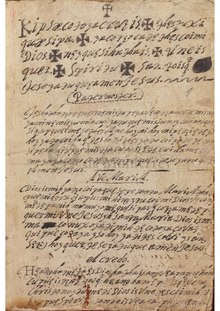Zoque languages
| Zoque | |
|---|---|
| O'de püt | |
| Geographic distribution | Chiapas, Oaxaca, Tabasco |
| Ethnicity | Zoques |
Native speakers | 110,000 "Zoque" and "Sierra Popoluca" (2020 census)[1] |
| Linguistic classification | Mixe–Zoquean
|
| Subdivisions |
|
| Language codes | |
| Glottolog | zoqu1261 |
 Locations (green) where Zoquean languages are spoken | |
The Zoque (/ˈsoʊkeɪ/)[2] languages form a primary branch of the Mixe–Zoquean language family indigenous to southern Mexico by the Zoque people.
Central (Copainalá) Zoque-language programming is carried by the CDI's radio station XECOPA, broadcasting from Copainalá, Chiapas.
There are over 100,000 speakers of Zoque languages. 74,000 people reported their language to be "Zoque" in a 2020 census, and an additional 36,000 reported their language to be Sierra Popoluca. Most of the remaining 8,400 "Popoluca" speakers are presumably also Zoque.[1]
Languages
[edit]Zoquean languages fall in three groups:
- Gulf Zoquean (Veracruz Zoque)
- Sierra Popoluca (Soteapan Zoque)
- Texistepec Popoluca
- Ayapa Zoque (Tabasco Zoque)
- Oaxacan Zoque
- Chimalapa Zoque (dialects: Santa María Chimalapa, San Miguel Chimalapa)
- Copainalá Zoque
- Francisco León Zoque
- Rayón Zoque (a dialect cluster)

Prayer book in Zoque from the 17th century
Justeson and Kaufman also classify Epi-Olmec as a Zoquean language,[3][4][5] although this claim is disputed by Andrew Robinson.[6]
Demographics
[edit]List of ISO 639-3 codes and demographic information of Mixean languages from Ethnologue (22nd edition):[7]
| Language | ISO 639-3 code | State | Municipalities and towns | Dialects | Speakers | Date/Source | Alternate names |
|---|---|---|---|---|---|---|---|
| Zoque, Rayón | zor | Chiapas state | Rayón and Tapilula | 2,100 | 1990 census | Zoque de Rayón | |
| Zoque, Copainalá | zoc | Chiapas state | Copainalá | Ocotepec, Ostuacán (Ostuacan Zoque). 83% intelligibility of Francisco León [zos] (most similar). | 10,000 | 1990 census | Zoque de Copainalá |
| Zoque, Francisco León | zos | Chiapas, Tabasco, Veracruz, and Oaxaca states | 1. northwest Mezcalapa Chiapas: into Tabasco, Veracruz-Llave, and Oaxaca, mainly near Grijalva River, Sayula area 2. southern Mezcalapa Chiapas: Grijalva River near Angostura Reservoir 3. eastern Mezcalapa Chiapas and Tabasco states: area surrounding northwest Guatemala tip, west bank of San Antonio River and Laguna de Naja 4. west central Mezcalapa Chiapas: upper reaches of Grijalva River |
Chapultenango, San Pedro Yaspac | 20,000 | 1990 census | Santa Magdalena Zoque, Zoque de Francisco León |
| Popoluca, Highland | poi | Veracruz state | Amamaloya, Barosa, Buena Vista, Col Benito Juárez, Cuilonia, El Aguacate, Estrivera, Guadalupe Victoria, Horno de Cal, Kilómetro Diez, La Florida, La Magdalena, Las Palmas, Soteapan; Bay of Campeche, area inland between Lake Catemaco and San Juan point, towards Hueyapan and Acayucan | 26,000 | 2000 INALI | Popoluca, Popoluca de la Sierra | |
| Popoluca, Texistepec | poq | Veracruz state | Texistepec area east of Oluta | 1 | 2011 UNSD | Texistepec | |
| Zoque, Tabasco | zoq | Tabasco state | Jalpa de Méndez municipality: Ayapa | 12 | 2016, J. Rangel | Ayapanec, Zoque de Ayapanec, Zoque de Tabasco, numte oote | |
| Zoque, Chimalapa | zoh | Oaxaca state | San Miguel Chimalapa and Santa María Chimalapa | 4,500 | 1990 census | San Miguel Chimalapa Zoque |
References
[edit]- ^ a b Lenguas indígenas y hablantes de 3 años y más, 2020 INEGI. Censo de Población y Vivienda 2020.
- ^ Laurie Bauer, 2007, The Linguistics Student's Handbook, Edinburgh
- ^ Justeson, John S., and Terrence Kaufman (1993), "A Decipherment of Epi-Olmec Hieroglyphic Writing" in Science, Vol. 259, 19 March 1993, pp. 1703–11.
- ^ Justeson, John S., and Terrence Kaufman (1997) "A Newly Discovered Column in the Hieroglyphic Text on La Mojarra Stela 1: a Test of the Epi-Olmec Decipherment", Science, Vol. 277, 11 July 1997, pp. 207–10.
- ^ Justeson, John S., and Terrence Kaufman (2001) Epi-Olmec Hieroglyphic Writing and Texts.
- ^ Robinson, Andrew (2008) Lost Languages: The Enigma of the World's Undeciphered Scripts, Thames & Hudson, ISBN 978-0-500-51453-5.
- ^ Eberhard, David M.; Simons, Gary F.; Fennig, Charles D., eds. (2019). "Mexico languages". Ethnologue: Languages of the World (22nd ed.). Dallas: SIL International.
- Wichmann, Søren, 1995. The Relationship Among the Mixe–Zoquean Languages of Mexico. University of Utah Press. Salt Lake City. ISBN 0-87480-487-6
Recordings
[edit]- Sierra Popoluca Collection of Lynda Boudreault at the Archive of the Indigenous Languages of Latin America. Contains audio recordings and transcriptions of Zoque and Soteapan in a wide range of genres. Some files are restricted but may be available upon request.

